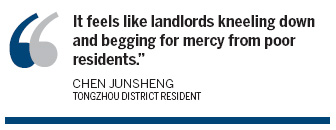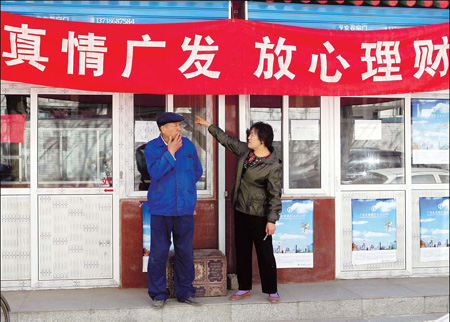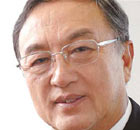Top Stories
Banks offer dodgy perks to Tongzhou's newly rich
By Shen Jingting (China Daily)
Updated: 2010-05-10 07:56
 |
Large Medium Small |
|
Two Tongzhou home owners talk in front of a branch of Guangdong Development Bank. Banks in Beijing have been vying for customers as large-scale renovation projects kick off in Tongzhou. [Wang Jing / China Daily] |
Secret cash refunds and gifts on offer
Banks in Beijing, thirsty for cash investment, have turned their eyes to money-laden victims of relocation, aiming to relieve poor liquidity through illegal promotions.
"It feels like landlords kneeling down and begging for mercy from poor residents," said Chen Junsheng, a 52-year-old man living near Beida Street in Tongzhou district, at the east end of Beijing.
Chen is among tens of thousands of relocated people, in Tongzhou district, whose homes have recently been pulled down as part of the municipal government plans to rebuild the area, starting this year.
The demolitions began last month, with 10,500 families in the first batch.
Most are being compensated at 15,586 yuan per sq m, but all had the chance to receive a 100,000-yuan bonus if they signed contractual agreements with the government between April 8 and April 27, according to officials in Tongzhou district government.
"Banks are handing out gifts. Their employees phone me, trying to persuade me. They even knock at my door and visit my house," Chen said, swinging a set of towels that he claimed was a gift from the Bank of Communications.
At least five banks, including Bank of Beijing, Postal Savings Bank of China and China Citic Bank, have set up temporary booths near Nongzhao Hotel, one of the three designated places where the government can issue housing compensation.

Though raising interest rates to lure savers is strictly prohibited by China Banking Regulatory Commission, banks have come up with alternative methods to attract investment - fuel cards, shopping cards and even cash refunds.
"You cannot imagine, a bank employee patted me on my shoulder and pulled me into a corner, saying he could secretly give me a 0.2 percent cash refund on my deposit," said Xie Haihu, a Tongzhou resident in his 60s, without naming the bank.
Xie revealed his 18-sq-m, single-story house was pulled down last week. He received around 400,000 yuan compensation from government.
Zhai Yue, from the Bank of Beijing's Tongzhou branch, said in addition to standard interest, savers can receive a 0.2 percent refund if they save money for more than one year.
"If you deposit 1 million yuan, we can give you 2,000 yuan back. We cannot provide cash, but we can give Carrefour shopping cards or mobile recharge cards. Customers can choose whichever they prefer," Zhai told METRO.
Salespeople from Guangdong Development Bank (GDB) said they are offering even more.
"We will return between 0.3 and 0.7 percent of the total deposit to clients. Clients can make requests and we provide tailor-made gifts," said Shan Meiqi, at GDB, inside a brick booth 10 meters from Nongzhao Hotel.
"If clients want electronic appliances, we can provide shopping credit at stores such as Dazhong, Gome and Suning.
"This promotion is only for those people who have been relocated. The deposit threshold for this privileged service is 100,000 yuan."
Zhang Heng, another employee at GDB, stood beside the road to Nongzhao Hotel, handing out brochures to passersby.
"Our bank set up a booth near here three months before the demolition started," Zhang said. "We were the early birds. We arrived at the very beginning of this year and conducted a comprehensive carpet search."
Zhang said he was confident his colleagues had visited almost every home in the demolition area.
Yang Siqun, associate professor at the School of Economics and Management at Tsinghua University, said targeting relocated residents could benefit banks in the long term.
"At present, banks absorb cash, and later, if people want to buy new homes, they can provide loans. They can also offer professional financing services," Yang said.
"But these recent moves are very close to breaking regulations."
The central bank issued a notice in 2000, saying financial institutions should not raise interest rates.
It also said gifts and other refunds are disguised forms of the same act.
Guo Tianyong, director of the China Banking Research Center of the Central University of Finance and Economics, said banks fiercely compete for depositors because of tight liquidity, caused by this year's rise in the deposit-reserve requirement ratio.
"The China Banking Regulatory Commission states that the loan-deposit rate should be no higher than 75 percent. Because the central government is paying close attention to credit loan problems at banks this year, this rate will be strictly supervised," he said.
However, according to first quarter reports, the rates at many banks already surpasses this amount.
Loan-deposit percentages at China Minsheng Banking Corp and Bank of Communications were 83.3 percent and 72.67 percent in the first quarter.








